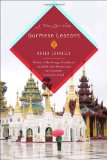Summary | Excerpt | Reviews | Beyond the Book | Readalikes | Genres & Themes | Author Bio

A True Love Story
by Karen Connelly
Plates of food are already arriving, heaps of greens and noodles and two whole fishes. And a pile of twisted, glistening stuff: very possibly a platter of silver worms. The ship's captain and a very rotund poet make a place for me between them and, once I'm seated, the introductory quiet closes up with voices again, like steady waves after a lull. Streams of Burmese rush around me, and English strides out into the air, directed to Anita, to me, and to a man I'd assumed was part of the local contingent but who is, in fact, Johnny, a Filipino photographer employed by Time magazine.
Everyone talks about books and writers, passing the names back and forth like gem dealers handling sapphires and rubies, marveling at the riches. Though at the mention of Tolstoy and Anna Karenina, San Aung pushes out his bottom lip in contemptuous-Frenchman style and huffs, "But it was too much, all those characters. I couldn't keep them straight. There were too many of them at the beginning and too many at the end." He laughs. "I did not read the middle, but I'm sure it was the same problem."
The ship's captain, clearly a great admirer of the old Russian writers, is scandalized. "But that is how Tolstoy..." He looks at me, open-mouthed, searching for the word on my white face. Apparently, he finds it. "That is how Tolstoy re-creates the world. He fills his books with real human beings. Yes, there are many of them; Russia is a big country! And all different kinds of people live in his work, not just one class or another class."
Is he really a ship's captain? He talks like a professor. I tell him, "Listening to you makes me want to be a writer."
He replies in a tone close to reverence, "You already are a writer. How fortunate!"
"But writing is hard work. And lonely. There may be a lot of characters in a story or a book, but the writer is always alone with them." I look around the table. "And there's never enough money."
My fellow writers at the table nod their agreement. But I know that none of them are spoiled as I am spoiled: by early success, by government grants and, most abundantly, by freedom. Yet still I complain. In Burma! It's disgusting.
Lately I've found my enthusiasm for my calling on the wane, partly because I know I'm stuck with it. Most of my life will be spent in a room in front of a computer, tapping out the visions in my head, reworking handwritten scrawls. This notion once filled me with delight. Now it just makes me want to get out of the room and meet someone for a drink—preferably someone who looks like San Aung.
However, the captain is right. Tolstoy has been dead for one hundred years, yet Anna Karenina is alive and beloved in Rangoon. It is extraordinary that something so still, so lifeless—black type on the cheap paper of Penguin's classic pocketbook—can contain a living world. A Burmese man can step into a time machine and go to nineteenth-century Russia just by turning one page, then another, and another, until he is entangled emotionally and intellectually in fictional lives. Strangers become his familiars.
Excerpted from Burmese Lessons by Karen Connelly Copyright © 2010 by Karen Connelly. Excerpted by permission of Nan A. Talese, a division of Random House, Inc. All rights reserved. No part of this excerpt may be reproduced or reprinted without permission in writing from the publisher.
Your guide toexceptional books
BookBrowse seeks out and recommends the best in contemporary fiction and nonfiction—books that not only engage and entertain but also deepen our understanding of ourselves and the world around us.